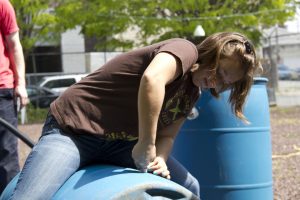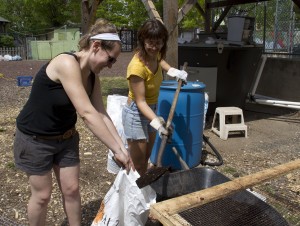
https://vimeo.com/41288499]
One nonprofit sustainability program is moving Fishtown toward a greener and cleaner future.

It is Sustainable 19125’s goal to make the 19125 ZIP code the greenest in Philadelphia, and community members are leading the way.
The program focuses on three particular aspects of the environment: The Big Green Block; Walk, Bike, Ride; and Green Blocks. Each category has various goals. The Big Green Block works to build green infrastructure, while Walk, Bike, Ride aims to limit personal car use.
“It’s never just one event, it always leads to other things,” said Angela Taurino, an Americorps VISTA and project coordinator for Sustainable 19125. “People love it. They’re really excited about it.”
But the on-the-ground efforts in Fishtown drive the program. Green Blocks focuses on easy, resident-driven actions. Through the leadership of green guides and block captains, local residents can participate in rain barrel workshops, recycling programs and purchase affordable, farm fresh foods, among numerous other opportunities.
“It’s very community focused and driven,” Taurino said. “One person on the block will act as a leader for green initiatives to get their block involved with environmentally friendly happenings.”

These community-based greening efforts have attracted the attention of city leaders. The work of Sustainable 19125 fits into Mayor Michael Nutter’s plan to make Philadelphia one of the greenest cities by 2015. Sarah Wu, the outreach and policy coordinator for the Mayor’s Office of Sustainability, explained the recent success.
“Sustainable 19125 does a great job at using neighborhood-level champions to spread their message,” Wu said.” “Research shows people are much more willing to listen to a message that comes from someone they’ve known for years that lives down the block rather than someone like me.”
Taurino agreed.
“The green guides do what interests them,” Taurino said. “They really drive the program and refocus where it’s going.”
The Sustainable 19125 initiative is run by the New Kensington Community Development Corp. and funded primarily by the William Penn Foundation and Pennsylvania Horticultural Society.
With that funding, Sustainable 19215 also operates the New Kensington Community Development Corp. Garden Center, located at Frankford Avenue and Berks Street.
Even the land the garden center sits on has been recycled. It was once home to an actual business that operated as a garden center. Today, it’s been reclaimed and now anchors the community’s composting efforts, in addition to serving as a home base for some of the program’s sustainability workshops.
“Now this is where we have our Compost Coop, which is where the community gets together and drops off organic materials and in return gets fresh compost for the garden,” Taurino said.
https://vimeo.com/40876831]
Fishtown residents now have an opportunity to compost without having to run a composting operation in their own backyard thanks to the Compost Coop. The Coop is a collaboration between Philly Compost and the New Kensington Community Development Corp.
Lindsay Stokley said this easy access to compost is what drew her to the garden center and Compost Coop.

“It’s a natural process, and I feel like people forget that sometimes,” Stokley said. “We would love to have our own compost pile in our backyard, but it would be a project that someone has to build and maintain. So, having this as a resource here it makes it easy because other people are helping to keep it going.”
Even the process for composting is run with the help of community members and volunteers. The composting collaborative requires people to join and purchase either a working or non-working membership. The earth tub needs to be turned and emptied when it’s full, and then the compost material needs to be sifted; all these steps are completed with the help of working Compost Coop members.
The New Kensington Community Development Corp. also sees the promotion of sustainability as a way to move the area’s revitalization forward. A study done by the Wharton School of Business at the University of Pennsylvania concluded that street tree plantings in the area raised the value of adjacent properties by 10 to 20 percent in the 19125 ZIP code, according to documents provided by the New Kensington Community Development Corp.
This positive impact on Fishtown and the surrounding neighborhoods has drawn national attention.

“People from New York to Chicago email me and ask me for these materials to use in their own neighborhoods,” Taurino said. “It’s not only a Philadelphia initiative, other cities are interested in it, too.”
Through community engagement and simple approaches to going green, Sustainable 19125 acts as a symbol of positive sustainable practices.
“The purpose is to be a flagship model for other neighborhoods, so we never turn down a service for someone living in another ZIP code,” Taurino said. “It’s basically a way of saying, ‘Hey, we’re doing this, you can do it too, here’s how you can do it.”’


Be the first to comment